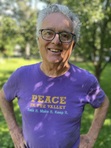Charlie Quimby's Blog
February 12, 2020
Small Abundances.
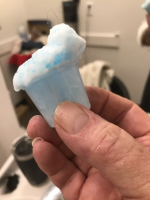 I spend my Wednesdays with people whose entire store of material possessions would fit in your garage.
I spend my Wednesdays with people whose entire store of material possessions would fit in your garage.
Yes, even in YOUR garage, packed so full you park your cars in the driveway.
Except maybe John's possessions. He has a house in Idaho, but it's polluted with black mold. A sister bought it for him after he cared for their mother for 30 years.
He has tools and maybe a motorcycle upon which his mother took rides when the weather was too hot to cruise in the California 1991 Mercedes he kept mint and still may sell to the discriminating buyer. There's more. But he spoke quietly and it was loud in the hallway.
The black mold made John ill, and he is just getting back on his feet. His feet are going on 80. His mother is approaching 98.
I asked if he wanted to shed his coveralls before the trim, but he admitted he only had underwear on underneath. He'd worn his other pair of Dickies yesterday to a meeting with the case manager, and this was all he had clean right now.
John was my first customer. I finished the day with Nick, who is working on a Celtic look, with shaved sides and dreads down the back. Since he was last, and had his own razor in his pocket, I humored him and razored his head.
The woman in hygiene dispensed far too much shaving cream for the job. The cup in the photo shows how much I had left after finishing.
It seems wasteful to proffer way too much shaving cream in our little world of scarcity, perhaps depriving someone else down the line. But we do it, in part, because advertising has conditioned us to believe that men need mountains white with foam to vanquish a few whiskers.
Better, I think, to offer small abundances to those who have so little. Linger over the shape of their beards. Scribe the lines perfectly, though they will soon be overgrown. Yes, others wait, but they, too, will be lavished with care when their turn comes.
I wash the excess lather down the sink, but Nick leaves happy, and I do, too.
So much for a penny's worth of wasted soap.
https://www.youtube.com/watch?v=8N3w9liDlVY
February 5, 2020
Ed's Chair.
Returning is bittersweet.
My first day back at the Day Center in Grand Junction, I step into the vestibule, and there is Will. When I was back in Minnesota, I read that he had been arrested for drug distribution.
Based on his rather contemptuous view of authority and his practice of redistributing legal marijuana in a town that did not have legal dispensaries, I feared Will might be back in prison.
But no. Here he is, talking about looking for a job. I'm glad to see him, because he is one of the street people who opens up the world to my limited sight, who I consider a friend.
Yet I'm sad to see him, because the chair he occupies is Ed's, another one of my favorite people.
Ed died while I was away.
Ed was one of the old school homeless. A self-sufficient alcoholic who didn't bother others. Who lived rough and paid the prices���bad health, sore bones, regular arrests for petty infractions. No future.
At the Day Center, Ed was decent and respected. He didn't like the hubbub inside, so he sat by the door and watched, absorbing it all, but rarely speaking unless spoken to. We fetched coffee for Ed, so he could man his post. It was not a group decision, and we didn't do that for other people. Independently, we brought him coffee because Ed had that sort of gravity that only comes from suffering borne without complaint.
We all wanted to help Ed, to get him away from demons so buried we didn't know what they were, but a cup of coffee from the inside was all he would accept.
It was the best we could do.
Some new volunteers have arrived since my last stint, and there is a new computer system at intake that makes the process less personal. Calling up records dampens my pleasure at being able to recall people by name.
 On the plus side, I can give haircuts for as many who want them.
On the plus side, I can give haircuts for as many who want them.
Today, I cut for most of my shift. Two women, a half dozen men.
One young man had a cough so bad, I had to ask him to leave. Not for my health, although the health of anyone who came into the room was a consideration, but because his cough was so violent, he couldn't stay in the chair.
I referred him to the clinic across the hall, and then sprayed down everything with disinfectant.
Another customer asked me to make him look respectable for his job search, "So I don't look like some homeless guy who gets drunk all the time."
The short haircut for his balding pate was easy. I spent more time on his beard, trimming it from neglect into a near fashion statement.
"I shake too much to trim my mustache," he confessed. "I want to keep the beard so I don't have to shave every day."
He left ready to interview. There's nothing I can do about the shakes.
On the way out the door, I learned something else about Ed's ending. It wasn't age or alcoholism or COPD that killed him. Someone beat Ed to death.
It will take me a while to put this together. I am always learning this world anew, where help and predation live side-by-side.
Where respect means something, until it doesn't.
December 6, 2019
Street Games.
The man greeted us with such familiarity, I thought at first my son knew him, but quickly it became apparent his enthusiasm came from a different recognition.
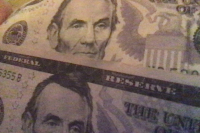 A familiar story began to unfold. I stopped him. I'd heard it many times on the street, a tale calculated and transactional. He needed money and he could see we had some to spare.
A familiar story began to unfold. I stopped him. I'd heard it many times on the street, a tale calculated and transactional. He needed money and he could see we had some to spare.
Don't give me that one, I said. But as I am attuned to lies, I am also reluctant to judge. I was willing to listen.
He and his wife were from Milwaukee, he said. She was pulling a roller bag and wearing tiara over her knit cap. They had come here to get a fresh start, but were still getting their bearings, for the moment, stuck sleeping under a bridge along the Greenway.
I asked him if he knew about Peace House and invited them to visit.
Can we get showers there?
No, but you can get meals and be connected to other resources.
Generally, I don't hand out money on the street. I know dozens of people who need money, people I trust and whose autonomy I respect. If I am guarded about giving them money, why pass it out to a stranger whose story is highly suspect? And why interrogate him because I am suspicious?
I hate being forced to judge, because I know the game, and I also know people in dire straits helped by generosity.
My money is power unless it is given in love. My questions are demeaning unless asked in genuine curiosity. How can I love this stranger I think is trying to scam me?
It is my choice. My heart is full after sharing a movie with my son. I can spare anything in my wallet. I can also stiff-arm the man and plead my volunteerism, my need for impartiality, my white man street wisdom. I can shrug him off because I think I know what he is up to. Because I have the power to decide. Because I know there are charities and agencies and places like Peace House set up to help.
I am here and they are not. It is not about the money, one way or the other. Not about whether he sees me as a mark, but how I see him. In this moment I can judge a panhandler or simply love a fellow human being.
Shit. I don't do this, I say, as I reach for my wallet. My fingers first touch a ten.
So be it. I hand it over.
Can you spare another five for my wife?
How about you share your ten, I say. Then you both have five.
My son and I cross the street.
Well, that's going nowhere good, I say to him.
He nods, knowing that is true in this moment. But also, I hope, because I have shown him the saving power of love.
November 22, 2019
Fridays with Abdi.
I was never a bad guy, he tells me, but I was surrounded by it.
Now, he says, he has left it behind. But what has taken its place?
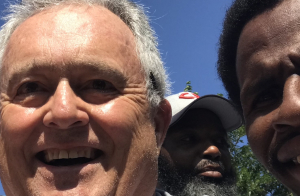
Abdi half in shadow in the back
Abdi and I stand in back of Peace House. The late afternoon sun has changed the cold pavement from something to flee into somewhere to linger.
He has a new bike. I joke that I don't recognize it because there's no U-lock clamped on the front fork. He rode his last bike for a year only able to turn in one direction because the key had broken off in the lock. We tried various strategies to remove it, but the best solution proved to be accepting that once again he was out of luck.
His bike before that was stolen after he was assaulted in a park. This too he accepted. After all, he's already gimped from a car accident. What is he going to do to three young guys?
He is not a bad guy, but it follows him.
How do you live a fulfilling life after you have screwed up too many times, suffer pain from a bad back, travel exposed through dangerous neighborhoods you don't have the means to leave?
You have to learn the way as you go.
He tells me about a trip to Mall of America where he walks as if in a dream, moving between this life and the next, not quite alive, not yet dead. He was high and he is old. Not that old, but too old to pretend he can start fresh. Too young to embrace the end, but old enough to see reasons to consider a short cut.
If you had kids, it would be different, he says. You would want to see how things turn out. But the days are pretty much the same. Abdi has no kids, and he has no illusion about how things end. He considers prayer, more as a good intention than a quid pro quo.
I nod in commiseration. We have no delusions about the ultimate future. Meanwhile, we like standing here in the sun talking about matters at the edge of consequence.
He has girl friend. Sometimes he visits, not intending to stay the night, but he sits in her rocking chair and thinks, this is better than mine. Her television is bigger than mine. He falls asleep and then wakes again at 1 a.m. and it is too late to go home.
That's how you know you are getting old, I say. You spend the night because your woman has a bigger television.
We laugh, and it reminds me of a few weeks ago when we were in the library, laughing about something. Suddenly, Abdi grew quiet. I forget now exactly what he said, but he had noticed a woman across the room involved in a tearful phone call. Abdi did not want our laughter to disrespect her pain.
He was never a bad guy, but now he is a good man. If only that were enough to smooth the years ahead, to fill the days as he rides through the park or walks the mall or heads to his girl friend's for a good night's sleep, only to wake again and stare down the midnight hours.
He walks in the door here most Fridays, and when he doesn't, I miss him. I suppose I should say so.
November 16, 2019
Daylight at the Oasis.
My occasional dispatches from Peace House Community come from a place of hope and positivity. I write of poignant moments and decent impulses, since there is already enough pain and darkness to go around.
But this picture is incomplete. A tough neighborhood surrounds us, overseen by imperfect, fragmented systems and buttressed by a safety net made of shoestrings.
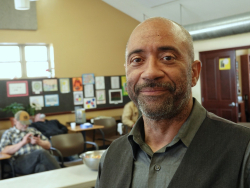 Yesterday, we learned about the death of a longtime community member, Peter, who had earlier in the week fixed our dishwasher. Street word, though immediate, can be inaccurate, and several theories floated. What's undeniable is that he has struggled with addiction and was found dead in his vehicle, which he used generously to transport people.
Yesterday, we learned about the death of a longtime community member, Peter, who had earlier in the week fixed our dishwasher. Street word, though immediate, can be inaccurate, and several theories floated. What's undeniable is that he has struggled with addiction and was found dead in his vehicle, which he used generously to transport people.
I got my first view of the new fence surrounding the back of Peace House and our parking lot. Since the police shut down nighttime stays in a nearby park, our back porch has increasingly become an overnight shelter for drug activity unwelcome on the block. Our lockbox for the key has been pried off the wall. Some mornings, the pavement is filthy with urine, vomit, needles and trash.
Last week, disgruntled men who had been banned for violence cut two tires of a volunteer. The fenceposts were in place, but the fencing itself came too late.
Also yesterday, police converged down the alley to arrest drug dealers believed responsible for recent overdose deaths in a nearby apartment building. The street drugs have become cheaper, more plentiful, unpredictable and lethal. Their marketing is inescapable if your background and addiction have consigned you to this poor neighborhood.
In our meditation yesterday, a recovering heroin addict told how dealers offered her free samples on the street and, after she refused, they followed her and threw in baggies of the drug when she opened her apartment door.
We want to be a good neighbor, and we certainly don't want to be blamed for bad actors who use our building to shield themselves from the street or congregate on the vacant lot across the alley. So we repair vandalism, install security cameras, erect fences and contribute to the cost of night patrols, spending money from a spartan budget that could better be used to benefit people.
Or could it?
An oasis can only exist in the desert. Peace in a war zone is most precious. Our candles have no effect in well-lighted places. So we head for the danger and, almost miraculously, it disappears for awhile.
August 9, 2019
Forward and Back, Their Hair Marks the Time.
Marcus comes in early to make an appointment. I give him the first haircut after lunch. He's an enthusiastic, grateful and punctual customer, with a sense of style. His business card say he's a day trader.
I don't have a business card any more, and if I did, it certainly wouldn't say, barber.
Marcus was my only signup, but when I whip off the drape, Joe-Vee calls out, and Terry is right behind him. Terry sits where he can watch me work. This is the first time I've seen him here at Peace House, and maybe he's deciding whether to trust me with his long blonde hair.
Joe-Vee wants a tight fade. I start conservatively and show him the mirror. He keeps saying, shorter.
As I cut, he's near to dozing. I remember those times in the barber chair when I spent money on haircuts. I wanted no chatter. I treasured the half hour I did not have to read or write or talk on the phone or look over someone's work or run off to a client meeting, take notes, sling advice, be on.
Joe-Vee needs the quiet as much as the haircut. When otherwise is it safe for him to close his eyes.
Terry waits at the end of the hall. People think he's waiting for the restroom, and Terry has to keep telling them he's not. Joe-Vee, Terry and I form a triangle of patience.
When I come back in from shaking out the drape, Terry asks me what kind of haircut he should get for prison. I don't know. I've never been inside, I say, but someone here could tell you.
I just want it off, he says.
The ponytail, too?
Square it off and taper it in back, Terry says.
His hair is long and fine, Norwegian blonde with a bit of Nordic grey at the temples.
When did you last get it cut?
About 12 years ago.
I snip off the tail in two hanks. They fall to floor, exposing a patch of gingery brown.
I tell him what I've found, how I plan to blend the unusual colors in the new cut. He tells me he had a girlfriend who liked to color it for him. She's gone, too, he says.
When do you have to go in?
Three weeks.
He can't see himself yet, the new Terry who used to look like every other blue collar ponytail man, stuck in a time warp. Now he's magnetic.
 He really is. I forgot my phone today and can't take his picture, so I'm using this photo of Karl Ove Knausgaard, the writer. Imagine Knausgaard roughed up a little, without the beard, hair shorter over the ears and blonder.
He really is. I forgot my phone today and can't take his picture, so I'm using this photo of Karl Ove Knausgaard, the writer. Imagine Knausgaard roughed up a little, without the beard, hair shorter over the ears and blonder.
I'm not cutting this hair all off, I say. It looks too good this way. I hold the mirror for him.
Maybe I'll go look for job, he says.
It's a joke and compliment and irony. I wish him well on his next three weeks. I wish this work did real magic.
Now Ellie comes over. Ellie's daughter died last month, leaving behind six children. I express my sorrow. She returned this week from the rez, where she had taken her daughter's ashes.
I haven't cut my hair yet, Ellie says. She wants me to clip it down to the scalp in back, ear-to-ear, halfway up her skull. She pins up the hair she will keep. I make the rest go quickly.
She doesn't tell me that this is her marker of sadness or reminder of loss. Perhaps it's presumptuous of me to assume this moment carries such spiritual weight. Still, I treat it so, like the time with Terry.
Writing this, I remember seeing Ellie once shearing her hair with borrowed clippers, after a grandchild had died. About two years ago. Enough time to grow the length I removed today.
July 26, 2019
Noise is Better Than Blood.
As I locked my bike outside Peace House, the peace was already broken. Voices raised. Words harsh. Brain chemicals choosing fight over flight. A fellow to whom I gave a haircut last week (schizophrenic, someone whispered) yelled at a woman who objected to his disrespectful way of reminding her she owed him money.
He had been fine on the barber stool. Appreciative. But he went off on others, especially, it seemed, women.
A Peace House regular stepped in when the man threw something at the woman. He's a good and helpful community member, but today his defense took up the tone of the offender.
(As Sun Tzu said, "Choose your enemies well, for you will come to resemble them." Or was it Nietzsche? Or Mark Twain or Anonymous?)
Now, they were toe-to-toe, nose-to-nose, ancient grievance-to-ancient grievance. Fists raised. M******F******s exchanged.
Funny. My meditation topic for the day was going to be about confronting a former adversary and finding peace.
I have gained distance from my enemies. This comfort zone is why I am more relevant to our community when I do haircuts instead of when I philosophize.
Today was a record. Eight customers���all but one from a tradition of haircutting different from mine.
No one had asked for a haircut, so I was out on the sidewalk checking my messages when Ali walked up and asked me to prune his scalp. After that, the floodgates opened, and I was busy for more than two hours.
Toward the end, a young guy asked if could give him a cut. Early on after telling me what he wanted, he flinched. I asked him what had happened. He showed me his blood-encrusted ear. He had fallen asleep at the bus stop and hit his head when he fell off the bench. He wrapped his fingers around the ear to protect it, which made the cutting difficult.
Then the Observer emerged from the restroom. He proceeded to tell me how I should cut the young fellow's hair.
It's okay. The passage to the restrooms gets a lot of traffic and I endure a lot of comments intended to be funny. But the Observer wanted to give a critique. He, too, cut hair and, as an African-American, surely had more experience in relevant barbershops than I. He wanted to tell me how I should be doing the taper ("Have you done a taper before?) and how to follow the natural hair line.
Duh, but okay. Please move on.
He continued giving advice on which clipper guide to use, questioning why I trimmed the neckline the way I did.
Peace.
Then he told me how I could not possibly taper the sides to the top. I offered him the clippers. He waved them off. I offered again after more critique. He waved them off again.
Near the end, the young man was laughing. He was happy with his haircut because I had taken it slowly, showing him each step of the process until we reached the result he wanted.
Then I sought out the Observer.
"You did not listen to me," he said. "I know how to cut hair."
"No disrespect to you," I said, "but when I am cutting, I only listen to the person on the stool."
"You did a good job," he said.
"Thank you," I said.
Noise is better than blood. Respect is better than noise.
July 13, 2019
The Hair They Left Behind.
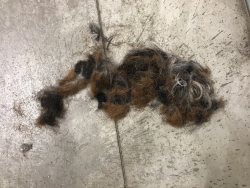 Today I had to keep cooling off the clippers because so many men were lined up for haircuts at Peace House.
Today I had to keep cooling off the clippers because so many men were lined up for haircuts at Peace House.
An old rocker who just wanted to look more presentable.
A Chinese man who had great hair already but wanted it shorter on the sides with plenty left on the top.
A middle-aged black man who told me to take it all the way down and luxuriated in the massage the vibrating clippers transmitted to his scalp.
Human touch, felt even through a machine.
A red-haired younger guy with a Spanish surname. He asked to go bald and keep his beard, but then changed his mind. I showed him how he'd look with a Van Dyke. Pretty cool, I thought, but he said, no, take it all off.
A Native man with a long ponytail wanted the front faded and the back left long. It was a challenge to do the fade without nipping the hair pulled back into the band, but when we were finished, he looked ready for the movies.
A kid with dreads asked, do you know how to do a line? Yeah, I said, but he left before his turn came.
I handed each the mirror, urging them to ask for whatever they wanted. Maybe I'm reading too much into it, but they seemed uncomfortable demanding too much.
Perfect, more than one said before I thought I was finished. Perfect.
These days, "perfect" can also mean, "that's enough."
Like Rumi, who said, "You must ask for what you really want," I want to tell them, this time is yours alone, for as long as you need. It's okay here to ask for what your heart desires, and I will do the best I can to fulfill it.
Now the day's the trimmings mingle on the floor. Before I sweep them up, I think of five men headed out in the world. A part of them is perfect for the moment, and they are part of this story, which could exist only because of their requests.
Why Do People Care About Getting a Haircut?
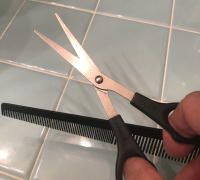 James came in for a haircut on his lunch break. A Native man with hair down to his shoulders. The anniversary of his mother's death is approaching and he wanted his hair cut short in her memory.
James came in for a haircut on his lunch break. A Native man with hair down to his shoulders. The anniversary of his mother's death is approaching and he wanted his hair cut short in her memory.
He's working now after many stints in prison. From three unstable jobs simultaneously to one that's steadier. He was present when she died. Her last words same out slowly, one breath at a time: "I love you, son... I love you, son... I love you, son..."
James told me he's stayed out of trouble since.
Chris was supposed to be my last trim of the day. He wanted his beard lined. As I cleaned the clippers in preparation, he asked how long I had been a barber.
I'm not a barber, I said, but I started in 1967, cutting hair in college.
Chris told me they had made him take two years of classes in prison before they let him cut the hair of other inmates.
We'd learned more or less the same way, by doing, but only one of us was supervised.
Would you like to do it yourself, I asked.
He nodded, and I handed him the clippers.
As Chris bent over the hand mirror placed on the stool in the hallway, Mark came out of the rest room. He was already well into his Friday night at 1:30 pm.
Why do people with no hair care so much about getting their haircut, he wondered aloud. What's the point?
Mark has a bushy grey beard and usually keeps the long strands on his head under a ball cap.
I could give you trim, I said. Mark is one of a couple guys I know will never ask me for a haircut, so I offer each time I see them, and they turn me down in the same light spirit.
But today, Mark's refusal had an edge.
You know why my hair's thin on top? I had it yanked out in clumps when I was a kid. I got no roots.
That's terrible, I said.
What can you do, he shrugged.
Avoid haircuts, I suppose. And not let anyone ever again touch your head.
April 10, 2019
I Hear Johnny Fournote for the First Time.
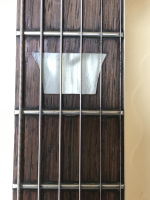 Johnny Fournote sits near the door I attend, plunking on his guitar. We don't allow canned music to be played inside the Day Center because it fills up a space already overflowing with sound.
Johnny Fournote sits near the door I attend, plunking on his guitar. We don't allow canned music to be played inside the Day Center because it fills up a space already overflowing with sound.
There's more tolerance for a human voice singing quietly, or a well-played guitar. In fact, we have several available to use. But if the music's too loud, we send them to the patio or vestibule.
Folks have different tastes, of course, and imposing your music on someone is the same as putting unwanted voices in their heads. Especially here.
Johnny isn't playing a song or even a riff. He's practicing a simple pattern, over and over. [For the musicians reading, it's two pairs of fifths. DDddDDddAD/CCccCCccGC/DDdd... Over and over and over...]
He played the same thing last time I saw him.
It bugged me then and it's starting to bug me now���in part, because it's so monotonous, and in part, because his picking doesn't swing or express feeling. It's just rote tapping: DDddDDdd...
But nobody else seems bothered, and Johnny is a big guy with a bit of temper, so why provoke him by asking him to go outside when he's calm? Why is the musician in me more important than the demons in him?
And with that question come memories of sitting alone in a basement, playing chord progressions over and over, letting the strings ring out, as if I were swimming stroke after stroke through a circle of sound, hoping to summon an emotion or quiet the one ripping through me so it can be distilled into a song but right now it just comes out as hums and grunts and nonsense scat chasing a melody through the thicket of the chords until I scare loose a line and maybe that flushes out another and still I am thrashing, no idea where I'm going except away from the fugal blackness that brought me here, and now I turn on the recorder in case anything good happens, in case some decent lyrics appear out of nowhere���that way I won't have to stop to write them down and risk breaking the spell���but even if it turns into nothing except good vibrations, I'll be further away from the dark.
Johnny's playing hasn't changed. It hasn't improved. But my listening has. He's off on a mind-body journey that has nothing to do with me or anyone else within earshot.
No, nothing to do with me at all.

